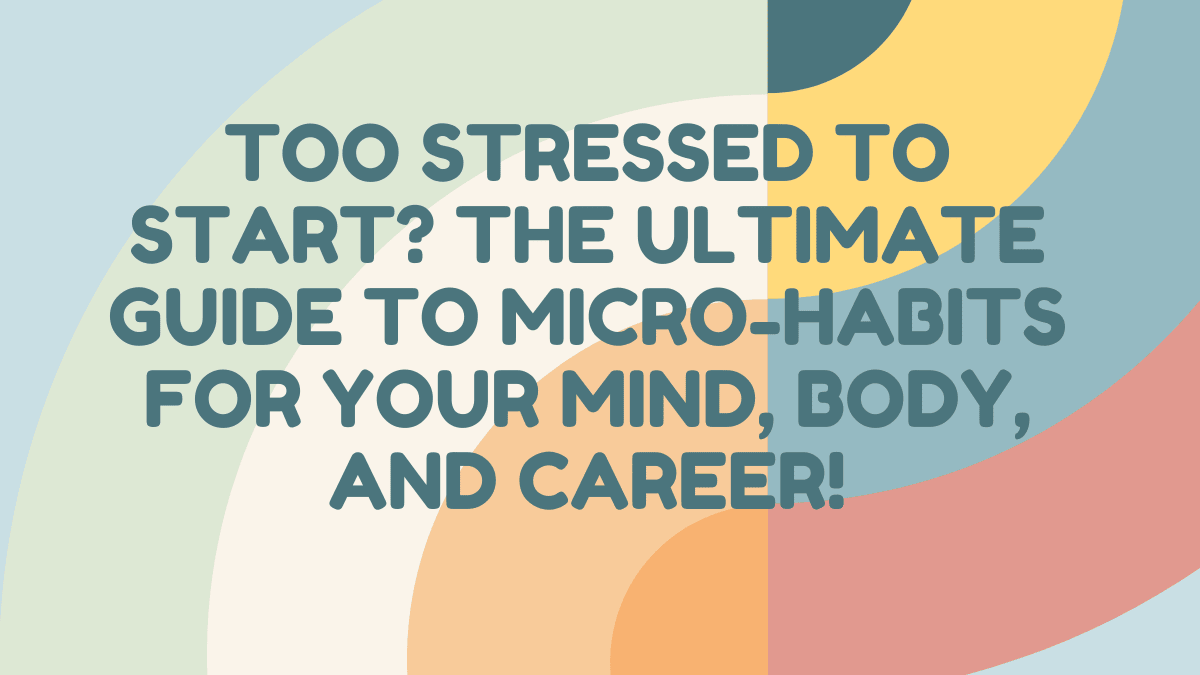Too Stressed to Start
Stress can feel like a brick wall, stopping you from tackling life’s demands—whether it’s mental fog, physical exhaustion, or career overwhelm. For young adults juggling student loans (averaging $30,000), rising rent, or endless work emails, the pressure is relentless. But you don’t need hours or a complete life reset to feel better. Tiny, 5-minute micro-habits can spark progress in your mind, body, and career, building momentum without adding to your stress. This guide delivers practical, human-focused habits you can start today to ease overwhelm and move forward, one small step at a time.
Why Stress Feels Like a Roadblock
Stress piles up when life’s demands—financial pressures, packed schedules, or digital noise—outpace your ability to cope. For Gen Z and Millennials, it’s amplified by:
- Financial strain, like rent eating up 30–50% of income or student debt affecting 45 million Americans.
- Constant connectivity, with notifications and social media fueling anxiety.
- Career pressures, like job insecurity or the hustle to “prove yourself” in your 20s.
- Mental and physical tolls, like trouble sleeping or feeling too drained to start.
Micro-habits work because they’re small enough to fit into chaotic days, delivering quick wins that reduce stress and build confidence over time.
The Power of Micro-Habits
Big changes—like revamping your career or mastering mindfulness—can feel impossible when you’re stressed. Micro-habits shine because:
- They take 5 minutes or less, so your brain doesn’t resist.
- They create small victories, boosting motivation and mood.
- They compound—5 minutes daily adds up to 35 minutes a week of progress.
- They’re flexible, fitting into any schedule, no matter how overwhelmed you feel.
This guide offers one core micro-habit for your mind, body, and career, plus extras to mix and match, all designed to be gentle, actionable, and encouraging.
Core Micro-Habits for Mind, Body, and Career
These 5-minute habits target stress in three key areas, helping you feel clearer, stronger, and more in control.
1. Mind: The Worry Dump
- What It Is: Spend 5 minutes writing down every thought, worry, or task clogging your brain—bills, deadlines, random stresses.
- How To Do It:
- Grab a notebook, sticky note, or phone app (e.g., Notes, Notion).
- Set a 5-minute timer and write anything on your mind, like “pay rent,” “work stress,” or “need groceries.” No order needed.
- Take 10 seconds to breathe deeply (inhale 4, exhale 4) when done.
- Optional: Pick one tiny thing to do today, like texting a friend or checking a bill.
- Why It Helps: Offloading thoughts reduces mental clutter (studies show journaling cuts anxiety by 20%), making stress feel more manageable.
2. Body: The Mini-Move
- What It Is: Do 5 minutes of light movement to release tension and boost energy.
- How To Do It:
- Choose something simple: stretch your arms, walk around your room, or do 10 gentle squats.
- Set a 5-minute timer and move at your own pace—no need for a gym or gear.
- Focus on one thing you notice, like how your muscles feel or the breeze outside.
- Optional: End with a quick stretch, like reaching for the sky, to feel refreshed.
- Why It Helps: Movement releases endorphins, reducing stress hormones by up to 15%, per research, and energizes your body.
3. Career: The One-Task Win
- What It Is: Tackle one small work-related task to feel productive without overwhelm.
- How To Do It:
- Pick one tiny task, like replying to an email, updating your to-do list, or organizing one file.
- Set a 5-minute timer and focus only on that task—no multitasking.
- Jot down a quick note about what you did, like “sent client email,” to feel accomplished.
- Optional: Cross it off your list for a visual win.
- Why It Helps: Completing one task boosts confidence and cuts through work-related stress, creating momentum.
Additional Micro-Habits to Mix In
Once you’re comfortable with the core habits, try these quick extras to keep stress at bay across mind, body, and career.
4. Mind: One Good Thing Note
- What It Is: Write down one positive thing about your day or yourself, like “I smiled today” or “The coffee was good.”
- How To Do It:
- Use a scrap of paper or your phone for a 5-minute note.
- Keep it simple—no need for perfection, just one good thing.
- Stick it somewhere visible, like your desk, or share it with a friend.
- Why It Helps: Shifts focus to positivity, reducing depressive thoughts by 15–20%, per studies.
5. Body: Quick Breath Reset
- What It Is: Spend 5 minutes on slow breathing to calm your nervous system.
- How To Do It:
- Sit or stand comfortably and breathe in for 4 seconds, out for 6.
- Count breaths or focus on your chest moving to stay present.
- Do it anywhere—desk, couch, or even a parked car.
- Why It Helps: Slow breathing lowers stress hormones and eases anxiety in minutes.
6. Career: Skill Micro-Boost
- What It Is: Spend 5 minutes learning one small work-related skill or tip.
- How To Do It:
- Watch a quick YouTube tutorial, read a career article, or practice a skill (e.g., formatting a spreadsheet).
- Set a 5-minute timer and focus on one thing, like “learn one Excel shortcut.”
- Jot down what you learned to feel accomplished.
- Why It Helps: Builds confidence in your career abilities without overwhelming your schedule.
7. Mind: Gratitude Flash
- What It Is: Name three things you’re grateful for in 5 minutes to lift your mood.
- How To Do It:
- List three things, big or small, like “my bed is cozy” or “I have a job.”
- Say them out loud or write them down in a note app.
- Take a moment to smile about one of them.
- Why It Helps: Gratitude boosts positive emotions, reducing stress by 10–15%, per research.
8. Body: Hydration Check
- What It Is: Drink a glass of water and notice how it feels to hydrate in 5 minutes.
- How To Do It:
- Fill a glass or bottle, sip slowly, and focus on the coolness or taste.
- Set a 5-minute timer to relax while drinking.
- Optional: Add a slice of lemon or cucumber for a small treat.
- Why It Helps: Hydration supports energy and focus, reducing physical stress symptoms.
9. Career: Network Nudge
- What It Is: Send one quick message to a colleague or connection to build your network.
- How To Do It:
- Text or email someone, like “Great working with you!” or “Let’s grab coffee sometime.”
- Keep it short, under 5 minutes, and authentic.
- Note the connection in a journal or app for follow-up.
- Why It Helps: Strengthens career relationships, boosting confidence and opportunity.
10. Mind: Tiny Tidy
- What It Is: Clear one small space, like a desk corner or bag, in 5 minutes.
- How To Do It:
- Pick one spot and set a 5-minute timer.
- Toss trash, organize papers, or wipe a surface.
- Step back and notice the clearer space.
- Why It Helps: A tidy space reduces mental chaos and creates a sense of control.
Practical Tips to Make Micro-Habits Stick
Here’s how to weave these habits into your life, even when stress is high:
- Start Small: Pick one habit, like the worry dump, and try it for 3 days. Add others as you feel ready.
- Make It Easy: Use whatever’s handy—your phone, a napkin, or no tools at all for breathing.
- Be Kind: No pressure to be perfect. Even 2 minutes is a win on tough days.
- Pair with Joy: Do your habit while sipping coffee or listening to music to make it feel good.
- Track Progress: Note each habit in a journal or app to see your wins stack up.
Overcoming Common Roadblocks
- “I’m Too Stressed to Start”: These habits are tiny for a reason—just 5 minutes. Try the worry dump to unload stress first.
- “I Don’t Have Time”: You do—it’s faster than scrolling. Do it during a break or while waiting for food.
- “It Feels Pointless”: Try one habit for 3 days. Small wins, like a clearer mind, add up.
- “I Keep Forgetting”: Set a phone reminder or tie it to a routine, like after breakfast.
- “I’m Too Tired”: Pick a low-energy habit, like breathing or the gratitude flash, and do it sitting down.
Tools to Support Your Micro-Habits
- Note Apps: Google Keep, Notes, or Evernote for worry dumps or gratitude notes.
- Timers: Your phone’s clock or apps like Forest for 5-minute focus.
- Movement Apps: GoNoodle or FitOn for quick stretches or walks.
- Career Resources: LinkedIn Learning or YouTube for 5-minute skill videos.
- Mental Health Apps: Smiling Mind or Headspace for free breathing or gratitude exercises.
Sample Week with Micro-Habits
Here’s a week to mix and match habits for mind, body, and career:
- Monday:
- Mind: 5-minute worry dump (“pay bills,” “work stress”).
- Action: Text a friend to ease one worry (2 minutes).
- Tuesday:
- Body: 5-minute mini-move (stretch arms and neck).
- Action: Sip water afterward to feel refreshed.
- Wednesday:
- Career: 5-minute one-task win (reply to an email).
- Action: Cross it off your list for a boost.
- Thursday:
- Mind: 5-minute one good thing note (“I ate lunch”).
- Action: Stick the note on your laptop.
- Friday:
- Body: 5-minute breath reset (inhale 4, exhale 6).
- Action: Notice how your body feels calmer.
- Saturday:
- Career: 5-minute skill micro-boost (watch a LinkedIn Learning clip).
- Action: Jot down one tip you learned.
- Sunday:
- Mind: 5-minute gratitude flash (“cozy bed,” “good coffee”).
- Action: Reflect on your week’s wins to feel lighter.
Frequently Asked Questions (FAQ)
Here are answers to common questions about micro-habits for stress:
- How can 5 minutes help with stress?Small actions reduce mental or physical tension, creating wins that build momentum. Research shows quick habits like journaling cut stress by 20%.
- What if I’m too overwhelmed to start?That’s why these are tiny—start with the worry dump to unload stress in 5 minutes.
- What if I don’t have time?You do—it’s quicker than checking social media. Try it during a coffee break or commute.
- Which habit should I start with?Try the worry dump for mental clarity, the mini-move for physical relief, or the one-task win for career progress—pick what feels easiest.
- What if I forget to do it?Set a phone alarm or link it to a daily habit, like after brushing your teeth.
- Can I do these digitally?Yes—use a notes app for the worry dump or a fitness app for the mini-move. Whatever works for you.
- What if my stress is about big issues, like debt?Micro-habits break big problems into small steps, like “check loan balance,” making them less daunting.
- How do I know if it’s working?After a week, you’ll likely feel less frazzled or more in control. Track your small wins to see progress.
- Can I combine habits?Absolutely—pair the worry dump with a breath reset or a mini-move for extra impact. Keep it under 5 minutes each.
- What if I need more help with stress?Try free apps like Smiling Mind or talk to a friend. If stress feels unmanageable, reach out to a counselor or doctor.

